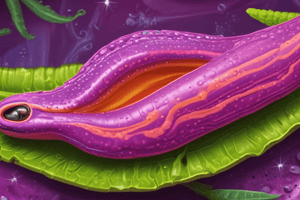Podcast
Questions and Answers
What is the main characteristic of flatworms that gives them their name?
What is the main characteristic of flatworms that gives them their name?
- Presence of hooks and suckers
- Bilaterally symmetrical body
- Organ level of organisation
- Dorso-ventrally flattened body (correct)
What is the function of flame cells in flatworms?
What is the function of flame cells in flatworms?
- Absorption of nutrients from the host
- Production of eggs and sperm
- Osmoregulation and excretion (correct)
- Regeneration of body parts
Which of the following is a characteristic of flatworms?
Which of the following is a characteristic of flatworms?
- External fertilization
- Acoelomate body (correct)
- Separate sexes
- Radial symmetry
What is the mode of nutrient uptake in some parasitic flatworms?
What is the mode of nutrient uptake in some parasitic flatworms?
Which flatworm is known for its high regeneration capacity?
Which flatworm is known for its high regeneration capacity?
What is the body organisation level of roundworms?
What is the body organisation level of roundworms?
What is the symmetry of roundworms?
What is the symmetry of roundworms?
What is the function of the excretory tube in roundworms?
What is the function of the excretory tube in roundworms?
What is the characteristic of the alimentary canal in roundworms?
What is the characteristic of the alimentary canal in roundworms?
What is the characteristic of fertilisation in roundworms?
What is the characteristic of fertilisation in roundworms?
Flashcards are hidden until you start studying
Study Notes
Characteristics of Flatworms
- Have dorso-ventrally flattened bodies, hence called flatworms
- Mostly endoparasites found in animals, including human beings
- Bilaterally symmetrical, triploblastic, and acoelomate animals
- Organ level of organisation
Features of Parasitic Forms
- Have hooks and suckers
- Absorb nutrients from the host directly through their body surface
Osmoregulation and Excretion
- Specialised cells called flame cells help in osmoregulation and excretion
Reproduction and Development
- Sexes are not separate
- Fertilisation is internal
- Development is through many larval stages
Regeneration Capacity
- Some members, like Planaria, possess high regeneration capacity
Examples of Flatworms
- Taenia (Tapeworm)
- Fasciola (Liver fluke)
Characteristics of Aschelminthes
- The body of Aschelminthes is circular in cross-section, earning them the name "roundworms".
- They exhibit organ-system level of body organization.
Body Structure
- Aschelminthes are bilaterally symmetrical, triploblastic, and pseudocoelomate animals.
- They have a complete alimentary canal with a well-developed muscular pharynx.
- An excretory tube is present to remove body wastes from the body cavity through the excretory pore.
Reproduction
- Sexes are separate (dioecious), with males and females being distinct.
- Females are often longer than males.
- Fertilization is internal, and development may be direct (young ones resemble the adult) or indirect.
Examples of Aschelminthes
- Ascaris (Roundworm)
- Wuchereria (Filaria worm)
- Ancylostoma (Hookworm)
Studying That Suits You
Use AI to generate personalized quizzes and flashcards to suit your learning preferences.




